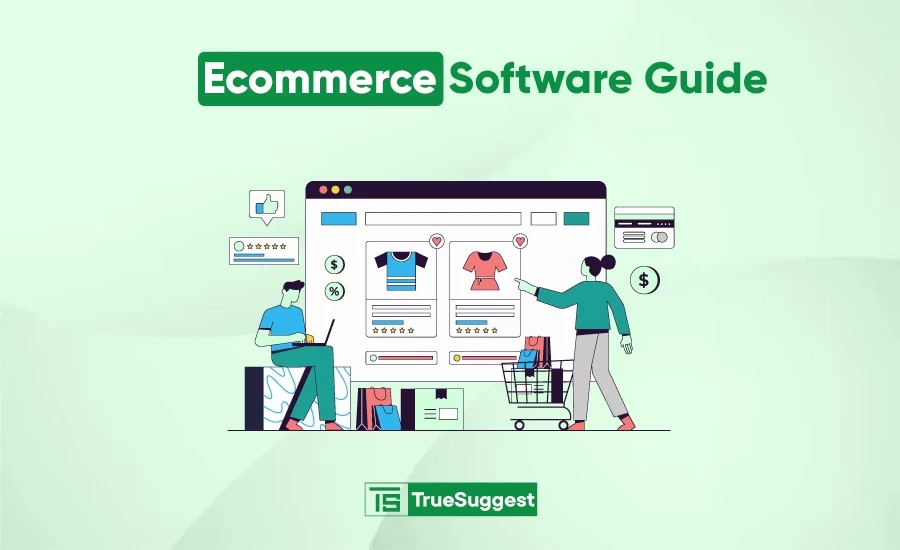Ecommerce Software Guide

E-commerce software is also known as an e-commerce platform or online store software. It's a complete package of tools designed to grow the business with digital touches. Ecommerce software has become an essential part of businesses nowadays. However, to utilize the software capacity in your business, you must obtain knowledge of that. In this article, we will give detailed ideas on ecommerce software and usage guides.
Ecommerce software is necessary to create, manage, and operate an online store. It increases the visibility and foundation of the store. This software provides the necessary infrastructure for buying and selling over the Internet. With ecommerce tools, owners can control order management, product listing, payment processing, and customer interaction.
Ecommerce software helps businesses to manage their storefront with customization options. Even owners can have insights on sales, store performance, and customer behaviour. It's a convenient choice for startups and small businesses. At the same time, mandatory options for enterprise level businesses.
Ecommerce software development opens a wide path of possibility for every business. Ecommerce software has few types based on business. So what are they?
Ecommerce software can be categorized depending on business needs, hosting, and customization. However, general features are almost similar in all of these types. However, there are minimal changes and feature differences, which makes every particular type worthwhile. Then, what are the significant types of ecommerce software?
SaaS (Software-as-a-Service) eCommerce Software
SaaS ecommerce software is a cloud-based ecommerce solution. These software are usually compatible with any kind of web browser. They're also subscription-based and include everything needed to run an online store. Compared to typical e-commerce stores, Saas software is easily upgradable without changing configurations.
Features of SaaS Software
- Cloud-based access
- Wide integration with third-party software
- Automatic features and security updates
- Hosting and SSL certificate included
- Scalable with any growing business
Open-Source eCommerce Software
Open-source ecommerce software is the best option if you want full access to your online store. It enables owners to have full control over the store's code, design, and functionality. Open-source software requires self-hosting and manual setup. However, using open-source software requires technical knowledge and skills.
Features of Open-source eCommerce Software
- Full control of business including store’s code
- Completely customizable fit business needs
- No subscription fee requires except hosting cost
- Can take control of high-traffic stores
Custom-Built eCommerce Solutions
Custom-built software is fully personalized software developed for specific business needs. With that software, store owners can build their desired system from scratch to particular requirements. Custom solutions offer flexibility in design, features, and scalability. However, if you’re looking for a custom software development partner, you can consult companies like bdtask.
Features of Custom-Built eCommerce Solutions
- Freedom to customize on demand
- Don’t need to depend on third-party software
- Best security and customizations
- Custom integration option with CRMs, ERPs, payment gateways, etc.
While ecommerce software is an inalienable element of online business, it has different kinds of software for different usages. However, many software has all features in one place. Which type of software is used most? Let’s have an overview of them—
Ecommerce Inventory Software: Inventory software is a tool to manage stock levels, track products, and maintain inventory related operations. Ensuring the product availability according to customer demand is its main goal. It helps businesses to avoid stock-out or over-stock and maintain supply chain management. Inventory software can integrate with eCommerce platforms, marketplaces, and point-of-sale (POS) systems and provide real-time stock levels.
Ecommerce Shipping Software: Shipping software helps online businesses to manage, optimize, and automate the shipping process. These are integrated with ecommerce platforms and warehouses to ensure real-time tracking and order fulfillment. Even stores can print shipping labels and track order processes with shipping software. It reduces manual effort and improves the accuracy of the shipping process. Overall, shipping software is a great invention which has a big impact on customer satisfaction.
Right now, ecommerce is considered to be the backbone of any business. Everyone's trying to focus on ecommerce to enlarge their business. E-commerce software is the primary and mandatory element for maintaining a store seamlessly.
Ecommerce software helps businesses to reach their global audience in an organized way. It's the best way to recognize your business in the global market by increasing brand visibility. It is also important to maintain a good reputation in business.
Marketing is also a powerful tool for business visibility. However, integration with marketing tools can provide remarkable results in attracting customers. It makes the promotion and running a campaign easier.
Ecommerce software is an essential option to improve the efficiency of the business. Besides, it has the ability to help boost revenue, save money and resources, and provide wide access to marketing tools. Moreover, ecommerce software can help increase customer satisfaction by improving the above mentioned factors.
1. What is the best ecommerce inventory management software?
Ans: Selecting the perfect ecommerce software is important for healthy business growth. Software must align with business size and type. Popular inventory softwares are Zoho Inventory, Cin7 Core, SkuVault, etc.
2. Does inventory management software support dropshipping?
Ans: Yes. Many software solutions support dropshipping by integrating with suppliers and automating order processing systems.
3. How much does eCommerce software cost?
Ans: Ecommerce software has a variety of prices depending on features and business requirements. Normally it has a range of $30 to $300+ per month.
























